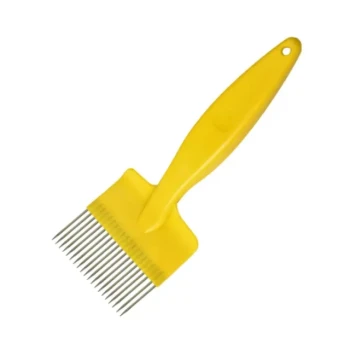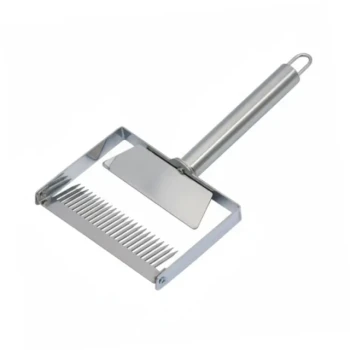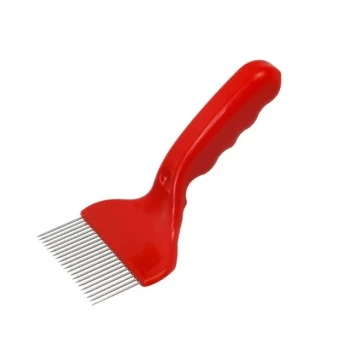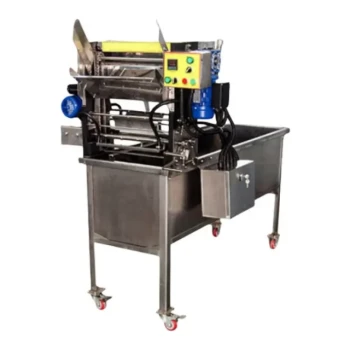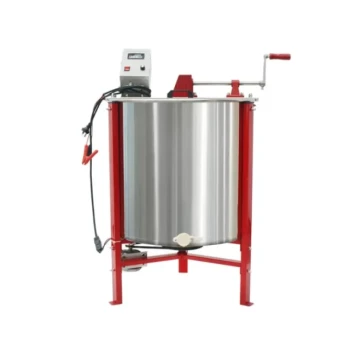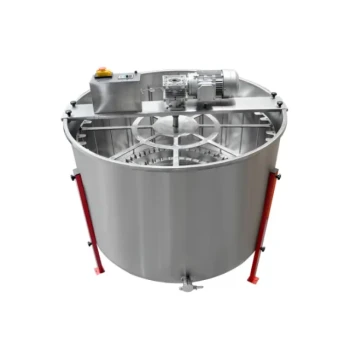In short, a manual honey extractor offers four primary benefits: affordability, operational simplicity, precise control over extraction speed, and independence from a power source. These advantages make it the default choice for beginner beekeepers, hobbyists with a small number of hives, or anyone who values a more hands-on, traditional approach to harvesting honey.
The decision to use a manual extractor boils down to a trade-off between cost and convenience. It is the ideal tool for small-scale operations where budget, control, and a tactile process are prioritized over the raw speed required for large-scale honey production.
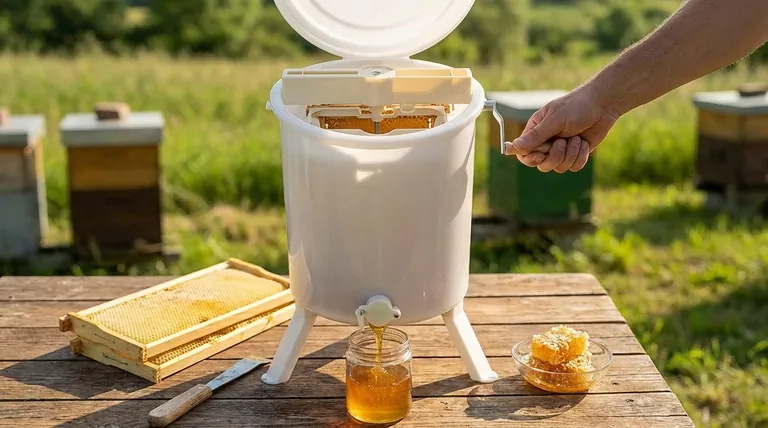
The Core Advantages of Manual Extraction
A manual extractor uses a hand crank to generate centrifugal force, pulling honey from the comb. While the principle is the same as an electric model, the manual operation provides distinct benefits that are perfectly suited for certain beekeepers.
Financial Accessibility
For those new to beekeeping, the initial equipment costs can be significant. Manual extractors present a much lower upfront investment compared to their electric counterparts.
This cost-effectiveness allows new beekeepers to allocate their budget to other critical areas, such as hive components or protective gear, while still having an effective tool for harvesting.
Simplicity and Precision Control
Manual extractors are mechanically simple, making them easy to operate and maintain. The hand crank gives you direct, tactile feedback and control over the rotational speed.
This level of control is crucial for protecting delicate combs, especially new or uncured ones. By starting slowly and gradually increasing speed, you can gently extract honey without blowing out the wax structure, preserving the comb for the bees to reuse.
Independence and Portability
One of the most practical benefits is that a manual extractor requires no electricity. This makes it completely portable and usable in any location.
You can set up your extraction process in a garage, a barn, or even directly in the field near your apiary, offering a level of convenience and flexibility that electric models cannot match.
The Hands-On Experience
For many hobbyists, beekeeping is about connection. A manual extractor enhances this by creating a more intimate and rewarding harvesting process.
The physical act of cranking the extractor and watching the honey flow provides a sense of accomplishment and a deeper involvement that many find more satisfying than simply flipping a switch.
Understanding the Trade-offs: Manual vs. Electric
Choosing a manual extractor means accepting certain limitations, primarily related to labor and scale. Objectively weighing these trade-offs against the benefits of an electric model is key to making the right long-term decision.
The Cost of Labor
The most obvious trade-off is physical effort. Cranking the extractor by hand requires sustained energy, which can be taxing, especially when processing honey from multiple hives.
For beekeepers with physical limitations or those who simply wish to minimize labor, the convenience offered by an electric motor is a significant advantage.
The Question of Scale
Manual extractors are best suited for small-scale operations, typically ranging from one to five hives. The time and effort required become a bottleneck as your apiary grows.
Electric extractors are designed for efficiency and can handle a much larger volume of frames. They are the clear choice for beekeepers managing medium-to-large-scale operations where speed is a primary concern.
Material and Design Considerations
While both manual and electric extractors come in stainless steel or plastic, the design often differs. Manual models may be tangential (spinning one side of the frame at a time), requiring you to flip the frames manually. Many electric models are radial, extracting from both sides simultaneously, further increasing efficiency.
Making the Right Choice for Your Apiary
Your decision should be guided by your current needs, future goals, and personal beekeeping philosophy.
- If your primary focus is starting affordably or managing a few hives: A manual extractor is the most logical and cost-effective choice, delivering excellent results without a large investment.
- If your primary focus is maximizing efficiency or you have physical limitations: The higher cost of an electric extractor is justified by the significant reduction in labor and time.
- If your primary focus is a hands-on, traditional experience: The unmatched control and tactile feedback of a manual extractor will provide the rewarding process you seek.
Ultimately, selecting the right extractor is about aligning the tool with the scale and style of your personal beekeeping journey.
Summary Table:
| Benefit | Key Advantage | Ideal For |
|---|---|---|
| Affordability | Lower upfront investment | Beginner beekeepers, budget-conscious hobbyists |
| Control & Simplicity | Hand-crank for gentle, precise speed | Protecting delicate combs, hands-on experience |
| Portability | No electricity required | Extraction in any location (garage, field, barn) |
| Scale | Efficient for 1-5 hives | Small-scale operations and hobbyist beekeeping |
Ready to choose the perfect extractor for your apiary?
At HONESTBEE, we supply commercial apiaries and beekeeping equipment distributors with high-quality, durable manual honey extractors and a full range of beekeeping supplies. Our wholesale-focused operations ensure you get reliable equipment that supports a gentle, efficient harvest.
Contact our experts today to discuss your needs and get the right tools for a successful honey harvest!
Visual Guide
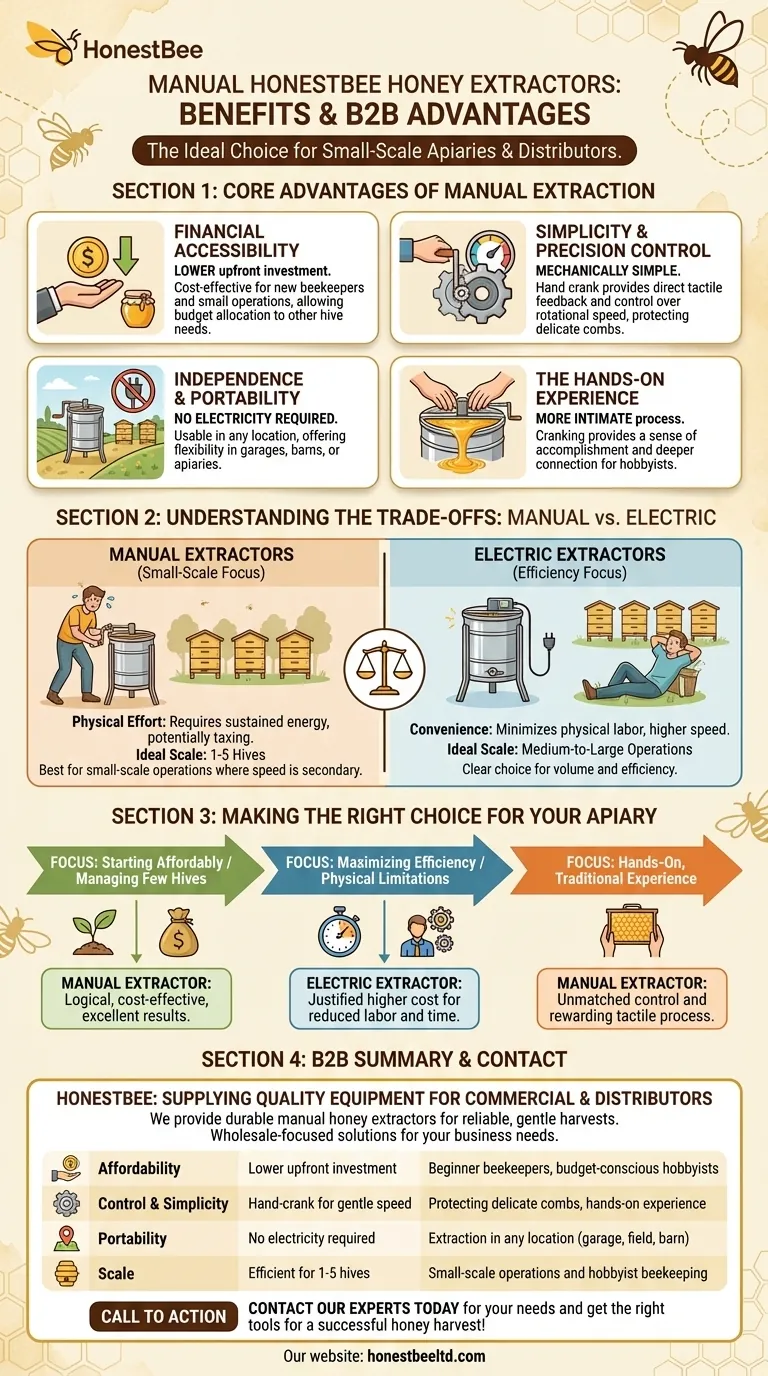
Related Products
- Plastic Hand Crank 2 Frame Honey Extractor Low Price
- 6 Frame Manual Stainless Steel Honey Extractor Beekeeping Equipment
- HONESTBEE 3-Frame Manual Acrylic Honey Extractor
- 2 Frame Stainless Steel Manual Honey Spinner Extractor for Beekeeping
- Professional Durable Plastic Handle Honey Uncapping Fork
People Also Ask
- What are the features of a manual honey extractor? Explore Top Benefits for Small-Scale Beekeeping
- What is the necessity of 1:2 ratio bevel gears in manual honey extractors? Optimize Extraction Speed and Efficiency
- For what scale of beekeeping is a manual honey extractor typically recommended? Ideal for Small Hobbyists
- How do you extract honey by hand? A Guide to Crush & Strain vs. Manual Extractor
- What are the advantages of manual centrifugal honey extractors? Ensure Precision in Your Honey Yield Statistics




